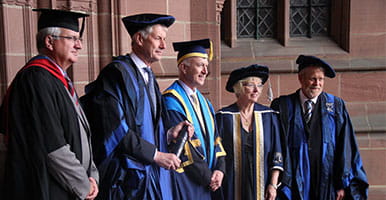Lynette Beardwood
Presented by Professor Frank Sanderson
Honorable Pro-Chancellor, I have pleasure in presenting Lynette Beardwood for the award of an Honorary Fellowship from Liverpool John Moores University.
Lynette Beardwood became a benefactor and supporter of Liverpool John Moores University ten years ago out of concern that financial pressure was putting university education out of reach of too many talented young people. She was all too well aware that her own family members including her parents and their siblings had had to leave school early to support the family, irrespective of how bright they were.
Lynette became a Trustee of the University and supports many student-focused initiatives, endows student prizes, and actively leads in the development of the LJMU Alumni Association which, amongst other activities, enables graduates in their turn to support those who follow them.
Lynette Beardwood, descended from a long line of Liverpool Carters and Dairy Keepers, was born in Great Sutton. In her infancy, the family moved to the Middle East when her father George was offered a job with Caltex in Bahrain.
Lynette returned to Britain in 1961 taking a place at Wirral Grammar School for Girls. After her formative years in the Middle East, this was quite a cultural shock and she didn't altogether enjoy the experience. She was in fact something of a rebel at school and was even expelled at one stage - if only for 12 hours. Despite all this, Lynette was a star pupil, often top of the class, passing examinations with ease and getting her 'A' Levels a year early.
After what would now be called a Gap Year, and having toyed with the idea of studying Law, she enrolled for an honours degree in Middle Eastern Studies at the London University School of Oriental and African Studies which included a summer term at the University of Tunis - from where she hitchhiked to Cairo with one of her fellow students Lewis Kerr, who also survived to tell the tale and is present today.
After graduation, her early working life took her into training, working in places as diverse as Finland and China, but her affinity with the Arab World meant that most of her time was spent in the Middle East, including Libya, Egypt, Saudi Arabia, Palestine and Israel where she saw first hand the value of education as the most important means of combating poverty and deprivation.
During this time, an assignment to train young technicians resulted in Lynette co-authoring two best selling books on technical English for foreigners.
The next decade saw a change of direction when in 1981 Lynette enrolled on the MBA programme at one of the world's top international graduate business schools - INSEAD in Fontainebleau near Paris. Not only was the programme fulfilling but also she met her husband Mario Anid (who is here today) a fellow MBA student from the Lebanon. Civil war and the Israeli invasion made living in Lebanon difficult, so they settled in London where Lynette worked mainly in the private sector in business communications and electronic security.
In 1983, she re-joined the First-Aid Nursing Yeomanry (FANY) which is an all-female volunteer unit which supports the civil and military authorities in times of crisis. In 1988, she was made a Captain and appointed to the Regimental Board. She retired from active service in 1999, but her experience as a historian and archivist were put to good effect when she wrote a book on the pioneering work of the Nursing Yeomanry as drivers on the Western Front during the Great War.
She also advises writers and filmmakers on women in the Special Operations Executive and has contributed several biographies to the Oxford New Dictionary of National Biography of prominent members of the SOE, including those of the wartime secret agents Odette and Lise de Baissac, on whose life the recently released film Female Agents is based.
Lynette and Mario now divide their time between Liverpool, Lebanon, and the South of France.
In Liverpool, Lynette has become increasingly involved in charity work, particularly in the Northern Docks area. And she and her mother Nell have assisted many of our students in financial difficulties by contributing to both the Hardship and Scholarship Funds. Lynette has also provided financial support for the Department of Fashion & Textiles, taken a leadership role in our Alumni Association, and established The Fairclough Prizes for Journalism, Fashion & Textiles, Business Studies and Public Health - in memory of all her aunts, including her Aunt Margaret who in 1924 was offered a place at Byrom Street Technical College (one of the original colleges of LJMU), but as the eldest of a poor family was obliged to leave school at 14 and find work.
Times have changed, but Lynette appreciates that there are still students who do not reach their potential because of financial difficulties. Our students have benefited from Lynette's generosity, but she has also been generous with her time, enthusiastically involving herself with our Alumni Association and taking an active role as a trustee of the University.
We are delighted to recognise her achievements and to demonstrate our gratitude for her tireless work for LJMU by awarding her a fellowship today.
Thus I have pleasure in presenting Lynette Beardwood, this most distinguished person and daughter of our city, for admission to our highest honour of Fellow of Liverpool John Moores University.



